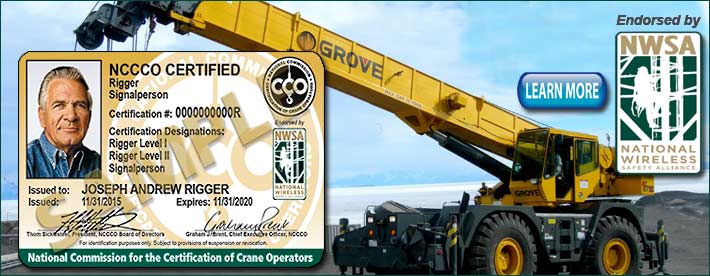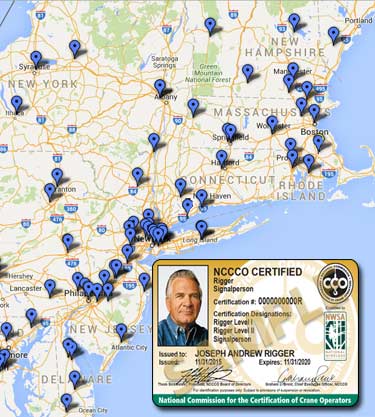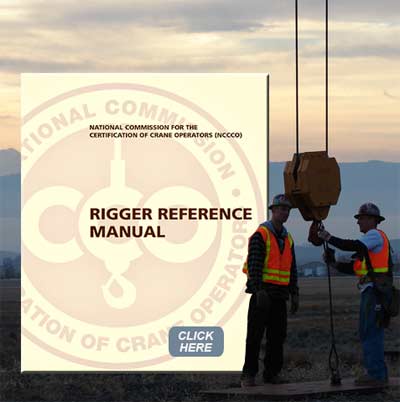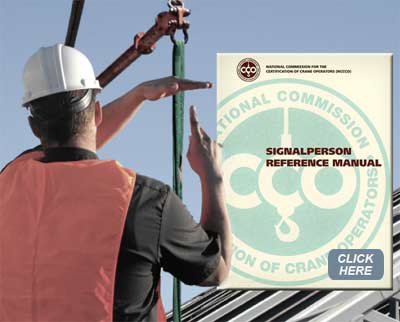
The National Wireless Safety Alliance (NWSA) announced today the official introduction to the wireless industry of CCO Rigger and Signalperson Certification programs. The programs have the distinction of becoming the first two assessment and certification offerings available to the wireless industry’s workforce through the NWSA.
Training and certification, when done correctly, have been shown to improve productivity, reduce accidents, save lives, reduce injuries, and assist companies in avoiding fines through proper regulatory compliance.

The computer-based tests are administered at approximately 300 test centers located throughout the nation.
The CCO Rigger and Signalperson certification programs are offered through a partnership with the National Commission for the Certification of Crane Operators (NCCCO). The nationally recognized and internationally accredited certification programs are the culmination of many years of hard work by NCCCO and experts from the various industries and groups that use rigging and cranes; including construction, steel erection, ironworkers, operating engineers, utilities, petrochemicals, specialty rigging companies and sling manufacturers.
“The formal introduction of the CCO Rigger and Signalperson certification programs represents a significant milestone for the organization,” said NWSA Board of Governors Chairman Art Pregler from AT&T. “For the first time, workers in the wireless industry will be able to obtain nationally recognized and ANSI accredited certification through the NWSA,” added Pregler.
The Rigger program will include certification offerings for both a Rigger Level I category and a Rigger Level II category. A certified rigger is a person trained and certified to handle rigging equipment to lift and move loads. The level of certification depends upon the individual’s training, knowledge, skill base, and ability to perform functions related to the selection, inspection, and proper use of rigging equipment. The Signalperson certification program is designed for signalpersons who are trained and who will use hand and voice signals in crane operation.
perform functions related to the selection, inspection, and proper use of rigging equipment. The Signalperson certification program is designed for signalpersons who are trained and who will use hand and voice signals in crane operation.
In order to obtain the Rigger and Signalperson certifications, candidates must achieve a passing score on both a computer-based testing (CBT) written examination and a field-based practical examination that is administered by a NCCCO authorized practical examiner. The computer-based tests are administered via computer at approximately 300 test centers located throughout the nation.
“NCCCO is proud to partner with the NWSA in order to offer co-branded certifications for our nationally recognized and internationally accredited CCO Rigger and Signalperson programs, “ stated NCCCO’s Director of Operations and Program Development, Joel Oliva. “Many subject matter experts affiliated with NCCCO have devoted thousands of hours to ensure the validity, reliability and continued integrity of the Rigger and Signalperson certification programs,” emphasized Oliva.
 The NWSA is a national non-profit assessment and certification organization that has been established to provide thorough, independent assessments of knowledge and skills and provide verifiable worker certification in order to enhance safety, reduce workplace risk, improve quality, encourage training, and recognize the skilled professionals who work on towers and other non-standard structures. The organization is the result of collaborative efforts between a broad coalition of the industry’s leading subject matter experts, companies and stakeholders representing wireless carriers, tower owners, OEM’s, turnkey management firms, small contractors, tower technicians and industry associations.
The NWSA is a national non-profit assessment and certification organization that has been established to provide thorough, independent assessments of knowledge and skills and provide verifiable worker certification in order to enhance safety, reduce workplace risk, improve quality, encourage training, and recognize the skilled professionals who work on towers and other non-standard structures. The organization is the result of collaborative efforts between a broad coalition of the industry’s leading subject matter experts, companies and stakeholders representing wireless carriers, tower owners, OEM’s, turnkey management firms, small contractors, tower technicians and industry associations.
Industry workers, companies and stakeholders are encouraged to visit the NWSA website to obtain more information on the certification programs and begin the process of registering for the Rigger and Signalperson computer-based and practical exams.
NCCCO DEFINITION OF A RIGGER
A certified rigger is a person who has been trained and certified to handle and move loads. The level of certification depends upon the individual’s training, knowledge, skill base, and ability to perform functions related to the selection, inspection, and proper use of rigging equipment.
This person may be qualified in a craft or trade and carry an occupational title such as iron worker, electrician, carpenter, millwright, mechanic, laborer, mason, longshoreman, lineman, pipe fitter, boilermaker, and the like. (The persons described in the categories above will be referred to as rigger even though they carry another occupational title.)
CERTIFIED RIGGER LEVEL I
NCCCO identified the following job duties for Rigger Level I certification. A Certified Rigger Level I can perform simple, repetitive rigging tasks when the load weight, center of gravity, the rigging, and rigging configuration are provided or known by the rigger through experience or on-the-job training prior to the rigging activities. Specifically, Level I Riggers should be able to demonstrate or have knowledge of how to:
- Inspect rigging before use
- Identify and attach rigging with basic knowledge of hitch configurations, capacities, and basic knots
- Recognize associated hazards
- Signal operations
- Use various types of rigging equipment and basic hitches and their applications
CERTIFIED RIGGER LEVEL II
In addition to knowing and demonstrating Rigger Level I knowledge and skills, a Certified Rigger Level II can select rigging components and procedures based on rigging capacity. A Level II Rigger can perform the following rigging tasks unsupervised:
- Estimate load weight and center of gravity
- Identify lift points
- Determine and select rigging based on loading
- Perform pre-use inspection of rigging and lift points
- Identify and attach rigging with knowledge of hitch configurations and load angle factors, rigging capacities, and load integrity
- Understand load dynamics and associated hazards
As applicable, Level II Riggers will also have a working knowledge of hoisting equipment, winches, jacks, industrial rollers, and similar equipment.
















